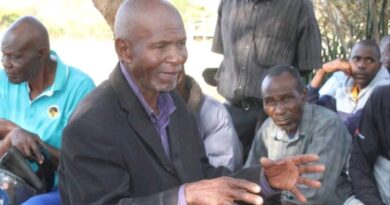World Braille Day raises awareness of braille as a means of communication
The Federation of Organisations of Disabled People in Zimbabwe (FODPZ) Wednesday joined the rest of the world in commemorating World Braille Day, observed to raise awareness of the importance of Braille as a means of communication in the full realization of the human rights of persons with visual impairment, partially-sighted people, and persons with the rare Usher Syndrome.
UNESCO declared January 4 as World Braille Day to raise awareness about the importance of braille as a tool for inclusion in the education and life of persons with visual impairment. The Usher Syndrome is a rare genetic disease that affects both hearing and vision. It causes deafness or hearing loss and an eye disease called retinitis pigmentosa.
Sometimes, it also causes problems with balance) according to the National Eye Institute (NHI) of the United States.
World Braille Day has been celebrated since 2019.
In a statement, FODPZ says it acknowledges the significance of this day and joins the rest of the world in commemorations.
FODPZ recognizes that Braille Day draws attention to challenges that persons with visual impairment and partially sighted persons face on a daily basis and in advocating for the rights of persons with visual impairment, on this day puts forward the following recommendations:
- World Braille Day offers a chance to promote conversations about the Enactment of the Persons with Disabilities Bill to domesticate the National Disability Policy, and the prevention, identification, and treatment of eye disease including access to medical services by all persons with disabilities. Persons with Disabilities commend the giant stride by the government for partially domesticating the UN Convention on the Rights of Persons with Disabilities (UNCRPD) through the adoption of the National Disability Policy (the first-ever, for Zimbabwe), but they recognize that the policy is not legally binding. There is a growing call for the expeditious enactment of the Persons with Disabilities Bill to make certain that it speaks to the provisions of the National Disability Policy.
- FODPZ calls upon the government of Zimbabwe to adopt the Marrakesh Treaty, an international legal instrument that makes it easier for the blind, visually impaired, and print persons with disabilities to access works protected by copyright. According to the World Intellectual Property Organisation (WIPO) the administered Marrakesh Treaty makes the production and international transfer of specially-adapted books for people with blindness or visual impairments easier. It does this by establishing a set of limitations and exceptions to traditional copyright law. The Marrakesh Treaty was adopted on June 27, 2013, and entered into force on September 30, 2016.
- While we note that this is a highly-contested issue, persons with disabilities especially with invisible disabilities (including those with partial visual impairment) should be issued with disability cards so that they benefit in all spheres including social protection and health care services. We recommend that the government commissions a survey to establish interest regarding this issue and allocate resources accordingly so that persons with disabilities use them as and when necessary.
- Government, OPDs, and Partners should increase sensitization on the correct disability terminology in all languages for example “persons with disabilities” instead of persons living with disabilities, in shona persons with visual impairments to be regarded as ‘vanhu vasingaone’ instead of ‘mapofu’.
- There is general outcry amongst persons with visual impairment and Usher Syndrome for equal access to livelihood programs especially women with visual impairment of lack and limited livelihood options. The traditional options of choice including begging are no longer viable owing to a limping economy. The allocation of market stalls by councils is biased toward people without disabilities. The recommendation is that Persons with disabilities be afforded (a minimum of 15 percent) allocation of accessible market stalls or any commercial space to ensure economic empowerment and self-reliance. Furthermore, employers across sectors should be compelled to have 15% of their workforce be persons with disabilities, consistent with section 3.2 of the NDP.
- Persons with visual impairment and Usher Syndrome are not happy with the current social protection programmes offered by the government. They indicated that cash transfers are not disbursed consistently, are inadequate to serve the intended purpose, and are not inclusive. They also complain that project loans come with stringent requirements rendering them inaccessible and ending up being returned to the treasury. The Department of Disability Affairs must devise other ways which are friendly to beneficiaries so as to increase the uptake of loans.
- FODPZ recommends that the Ministry of Primary and Secondary Education establish resource units at every school with the necessary support services to achieve the desired outcomes of inclusive education. Support should also be provided to caregivers or parents of children with visual impairment and Usher Syndrome to cater to their self-care and educational needs through halfway homes that promote a conducive learning environment under inspection by the Ministry.
- Government should support the provision of both software and hardware ICT to persons with disabilities so that they have access to meaningful communication. ICT should be easily available, affordable, and accessible to persons with visual impairment and Usher Syndrome.
- Accessibility of Infrastructure and ICT, are the critical aspects of their fundamental services, and also, the major drivers toward the achievement of disability inclusion globally. Government should make all infrastructure (new buildings and government/public institutions (e.g building ramps, braille signages, and demarcations), marketplaces (e.g flea markets as well as having shops to have commodity and price tags in braille) transportation (e.g buses with lower steps for wheelchair-users), water and sanitation points (boreholes) accessible.
- According to the World Blind Union (WBU) on 2023, Braille Day Celebrations, the UN Convention on the Rights of Persons with Disabilities (CRPD) is the key guiding document for the global disability movement. The CRPD outlines obligations for those countries who have ratified the Convention, including obligations regarding access to braille. Article 21 of the CRPD requires member states to ensure that information intended for the general public is in accessible formats such as braille, and article 24 requires that in the education system, students who are blind receive their education in the modes that are most appropriate to their needs, such as braille from educators who are fluent in braille.
How this day can also be celebrated
One can celebrate this day by learning Braille with resources like charts and Braille translation software. One can even promote the work of persons with visual impairment or low-vision artists, persons with usher syndrome (a rare genetic disease that affects both hearing and vision loss) writers, and other creative individuals.
#LeaveNoOneBehind
#InclusivityIsKey
Inserted by FODPZ Secretariat.



